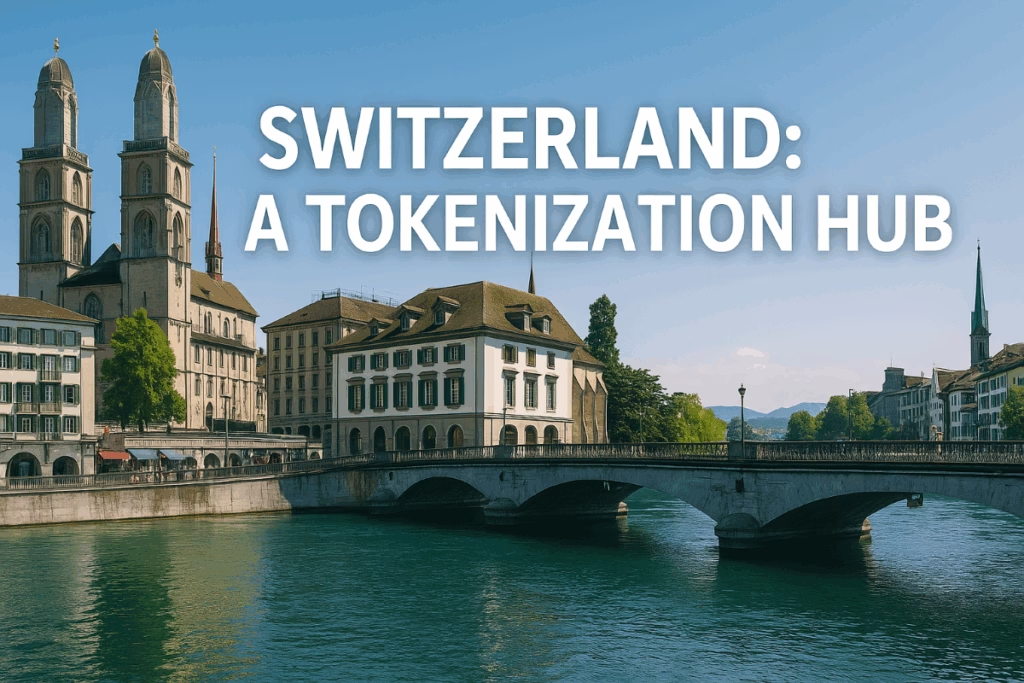Switzerland is emerging as a global hub for asset tokenization, combining progressive regulation, a crypto-friendly banking sector, and blockchain innovation to attract fintechs, institutions, and tokenization platforms from around the world.
“By tokenizing the Swiss franc, Switzerland once again demonstrates its leadership in the global race for digital transformation and financial innovation.”
— David Newns, Head of SIX Digital Exchange
Switzerland has long been known for its robust financial system, economic stability, and innovation-friendly regulatory environment. Today, the country is emerging as a global asset tokenization hub, leveraging blockchain technology to transform traditional finance, real estate, and commodity markets.
From the launch of crypto-friendly regulations to the development of a fully integrated digital securities exchange, Switzerland is paving the way for a decentralized financial future. This article explores how the country has established itself as a powerhouse in tokenization and what makes it the ideal hub for blockchain businesses.
Switzerland’s Legacy as a Financial Powerhouse
Switzerland’s dominance in tokenization is no accident. Its rich history in banking and financial services laid the foundation for a smooth transition into digital finance. Key factors that have contributed to Switzerland’s leadership in tokenization include:
1. Strong Banking and Financial Sector
For decades, Switzerland has been a global banking hub, attracting high-net-worth individuals and institutional investors due to its strong privacy laws, secure financial infrastructure, and pro-business policies. This deep-rooted expertise in managing wealth and investment assets made the transition to blockchain-based finance seamless.
2. Early Adoption of Blockchain and Crypto
Switzerland was one of the first countries to recognize the potential of blockchain technology. The government took proactive steps to establish clear regulations around digital assets, thus attracting some of the world’s largest crypto exchanges, blockchain startups, and tokenization platforms.
3. The Birth of “Crypto Valley” as an Asset Tokenization Hub
In the heart of Switzerland lies Zug, famously known as “Crypto Valley”. This blockchain-friendly region houses over 1,000 blockchain and fintech companies, making it one of the world’s largest ecosystems for decentralized finance (DeFi) and tokenized assets.

Switzerland’s Tokenization Framework: A Blueprint for the World
Switzerland has crafted a regulatory framework that provides legal clarity for businesses engaging in asset tokenization. Therefore, this has positioned the country as a global leader in security token offerings (STOs) and tokenized financial products.
1. Progressive Regulatory Environment
First, unlike many countries that are still struggling with blockchain regulation, Switzerland provides a transparent and business-friendly legal framework.
- The Swiss Financial Market Supervisory Authority (FINMA) recognizes security tokens and ensures they comply with traditional financial laws.
- The Swiss DLT Act (2021) created legal certainty for tokenized assets, ensuring that digital securities could be legally owned and traded on blockchain networks.
- The Federal Council’s DLT Regulation improves investor protection, while making Switzerland the first country to fully integrate blockchain into its legal system.
2. The Swiss Digital Exchange (SDX)
Next, one of the most groundbreaking developments in Switzerland’s tokenization landscape is the Swiss Digital Exchange (SDX).
- Operated by the Swiss Stock Exchange (SIX), SDX is a regulated blockchain-based exchange that enables the trading, settlement, and custody of tokenized securities.
- SDX offers instant transaction settlement, eliminating counterparty risks and reducing trading inefficiencies in traditional markets.
With this initiative, Switzerland has become the first country to integrate blockchain into a fully functional capital market.
3. Institutional Adoption of Tokenization
Leading financial institutions in Switzerland, including UBS, Julius Baer, and Credit Suisse, are actively investing in tokenized assets and blockchain finance.
- UBS launched the world’s first digital bond in 2022, tokenizing a traditional financial instrument on SDX.
- Julius Baer is integrating blockchain-based wealth management solutions to offer clients exposure to crypto and tokenized investments.
These developments demonstrate how Switzerland is bridging the gap between traditional finance and blockchain technology.

Key Sectors Leading To Switzerland as an Asset Tokinization Hub
Switzerland is pioneering tokenization across multiple industries, making it a leader in the global digital asset economy.
1. Real Estate Tokenization
Real estate tokenization is revolutionizing property investment by fractionalizing ownership and increasing liquidity in traditionally illiquid assets.
- Swiss real estate firms are launching blockchain-powered platforms that enable investors to purchase fractional shares of properties through digital tokens.
- The Swiss Real Estate Token project has made luxury property investment accessible to retail investors through security token offerings (STOs).
2. Tokenization of Precious Metals and Commodities
Switzerland is home to global gold refiners and commodity trading hubs, making it a natural leader in tokenized metals and raw materials.
- Swiss-based companies like Tiberius Group and Paxos are issuing gold-backed tokens, allowing investors to trade digital gold assets backed by physical reserves.
- Commodity tokenization platforms are being developed to streamline supply chain processes, reducing costs and increasing transparency in global trade.
3. Art and Collectibles Tokenization
Switzerland’s reputation in fine art investment is expanding into blockchain with NFT-based ownership models.
- Crypto-friendly art galleries in Zurich and Geneva are now offering tokenized paintings and rare collectibles.
- Blockchain-based art investment funds are allowing fractional ownership of masterpieces by Picasso and Van Gogh, democratizing access to high-value artworks.
Switzerland’s Competitive Edge as an Asset Tokenization Hub
The country’s dominance in asset tokenization is driven by several competitive advantages:
1. Favorable Tax Environment
- Low corporate taxes and crypto-friendly taxation policies encourage blockchain startups and institutional investors to establish operations in Switzerland.
- The Swiss tax authorities classify cryptocurrencies as assets, ensuring they are subject to clear and predictable taxation policies.
2. High-Level Blockchain Expertise
- Switzerland is home to top blockchain research institutions, including the Swiss Federal Institute of Technology (ETH Zurich) and the University of Basel.
- The country hosts global blockchain conferences, fostering collaboration between regulators, investors, and technology pioneers.
3. Strong Investor Protection and Legal Certainty
- Switzerland’s DLT Act ensures that tokenized assets are legally recognized, offering investors a secure and transparent regulatory framework.
- The Swiss National Bank (SNB) is exploring Central Bank Digital Currencies (CBDCs) to further strengthen the country’s blockchain-based financial system.
Conclusion: Switzerland is Cementing its Position as an Asset Tokenization Hub
Switzerland is at the forefront of the tokenization revolution, combining regulatory innovation, financial expertise, and blockchain technology to create a leading-edge digital economy.
With the Swiss Digital Exchange (SDX), progressive regulations, and institutional blockchain adoption, Switzerland is setting the standard for global asset tokenization. Furthermore, as more industries embrace fractional ownership, tokenized real estate, and commodity-backed digital assets, Switzerland will continue to shape the future of decentralized finance (DeFi).
Lastly, if you’re looking for the best place to invest in tokenized assets or launch a blockchain-based business, Switzerland is the ultimate destination.
FAQs About Tokenization in Switzerland
Switzerland offers progressive crypto regulation, a supportive banking system, and a thriving blockchain ecosystem—making it a prime destination for tokenization projects.
Banks like SEBA, Sygnum, and Julius Baer actively support tokenized asset custody, trading, and blockchain integration.
The Swiss DLT Act and guidance from FINMA provide legal clarity on digital securities, token issuance, and asset custody.
Switzerland leads in regulatory maturity and institutional adoption, while Dubai offers tax incentives and Singapore focuses on fintech integration.
Yes. Many Swiss platforms are open to international investors, subject to KYC/AML compliance and regulatory alignment with local laws.
Ethereum and Tezos are widely used, along with private chains for institutional products. Several platforms also explore Avalanche and Polkadot integrations.
We use AI tools to enhance research and drafting, always under human supervision.

